 |
|
Welcome to issue no. 3 / 2008 of EWC News. 6th October 2008
|
|
The training and consultancy network
"euro-workscouncil.net"
EWC
News appears four times a year.
You can find past issues in the newsletter archives.
|
|
1.
Frame for a new EWC
Directive stands
|
|
Political breakthrough on Chantilly Castle
During the summer break there were intensive discussions between the social partners to overcome the remaining differences. On August 29th, 2008, they presented to the public a common recommendation with eight concrete wording suggestions which shall be changed in the bill. However this change little in the core of the basic philosophy of the outline. More important is the fact that with this joint recommendation all sides have politically accepted a revision of the EWC Directive in the suggested scale. Objections as they were formulated by the employers' federations or further-reaching demands of the trade unions (see report in EWC News 2/2008) will hardly play any role. Since it isn't a full revision of the EWC Directive but merely a "recast" (a restatement of the existing Directive) as originally planned, the influence possibilities of the European Parliament are strongly restricted. On October 2nd, 2008 the bill was again on the agenda of the meeting of EU Ministers of Labour in Luxembourg. They declared in view of the joint recommendation of the social partners for the fast adoption of the changed Directive. A meeting takes place in Lyon for the transnational social dialog on November 13th and 14th, 2008 where the topic is discussed publicly once again. Paper of the British government caused unrest
The British government warns of a setback for the European works councils if the legislator limits the flexibility of the business parties too much. This could deter many companies from the formation of an EWC, which don't have any EWC till now yet. An over-regulation would actually weaken the employee voice on a transnational level. Labour Party representatives in the European Parliament however do not share this liberal opinion, they stand behind the demands of the trade unions.
The British lobby work behind the scenes, however, couldn't prevent the joint recommendation of the social partners from August 29th, 2008. Therefore the British Department for Business, Enterprise and Regulatory Reform (BERR) reacted promptly and published a consultation paper on September 11th, 2008. Until October 6th, 2008, British companies can transmit their opinion, which then is given effect by the British government in the European Council of Ministers. Impact assessment of the European Commission
To be prepared for such objections, the European Commission worked out an impact assessment of its own for the revision of the EWC Directive. The document was published in July 2008. Trade unions present memorandum
The European trade union institute in Brussels published a scientific memorandum for the revision of the EWC Directive on August 26th, 2008. Based on current experiences concrete recommendations are formulated to the politics.
Symposium to the new EWC Directive: What comes towards us there?
The symposium is carried out in German. Interested parties in other languages are invited to contact us directly for the purpose of individual arrangements.
|
|
2.
Calculation: How much
does an EWC meeting cost?
|
|
Study estimates costs
of the EWC work
So a plenary session of an EWC costs on average € 101,000 and reaches in the individual case € 370,000. Half of it is being allotted to travelling expenses (15%), interpreters (22%), hotel and catering (15%). The continued payment of wages of the workers' representatives is calculated with 29%. The costs of the steering committee come to on an average € 25,700, what contains three annual meetings. A further education for the complete EWC costs € 43,800. Even higher costs cause the SE works councils, so the name of the European works council in the European Company (SE). The "most expensive" EWC meetings carry out French companies, followed by German companies, while the EWC costs are less than half as high in British and non-European companies. It can hardly astonish that the quality of EWC participation rights is also developed differently.
Working time of the managers a part of EWC costs
The participation of employer representatives in EWC meetings makes an impact with 14% in the calculation. This isn't travelling expenses but merely around the working time. As a rule, the CEO reports together with further managers of the topmost executive level in an EWC plenum meeting. It is reported in the study that in some enterprises up to 13 managers report in the EWC meeting. On today’s usual top salaries a four-hour Powerpoint presentation of the management can therefore drive the budgeted costs of an EWC quickly into dazzling height. This may also be one of the reasons why the legally specified minimum number of EWC meetings shall not be increased in the opinion of the employers' federations.
High adviser costs in French companies
To be able to meet the policy units of multinational companies on a par, workers' representatives need good advisers. The costs for it amount in non-French companies on € 3,500, in French companies however on € 143,700 and in the individual case up to € 500,000 every year. These numbers show why French councils significantly exhaust their information and consultation rights (if necessary also by legal proceedings) better than councils of other countries. Even well equipped German councils have a considerable catch-up demand in this (see report in EWC News 1/2008).
The cost differences are easily explained: as a rule, a European works council outside France is advised by a full-time trade union officer who doesn't bill for his activity. On the other hand, there is only little full-time trade union machinery in France which hardly is able to guarantee the continuous advice of a variety of EWC bodies. This gap is closed by private consultancy companies like the Groupe Alpha or Syndex. An additional difference: the EWC in many big German companies has employed subject specialists on a regular basis at its disposal who aren't credited as adviser costs although they do the same work. The British government also has checked more exactly
|
|
3. Finance
market crisis: a coordinated EWC action started
|
|
UNI Finance demands special meetings in 51 European works councils
In the opinion of UNI Finance the finance market crisis is a situation of extraordinary circumstances, which seriously concern the interests of the employees. The current EWC Directive provides the right to special meetings for it. UNI Finance publishes up-to-date reports on the crisis from a trade union viewpoint on a special web page.
UNI Finance put forward a list of requirements for the better supervision of finance institutes and rating agencies already in September 2007 and pointed to the ethical and social dimension of the financial crisis. After the crisis had intensified, UNI Finance demanded a better regulation of the finance markets in May 2008 once more. The European Trade Union Confederation (ETUC) voiced in favour of fairness and determined behaviour at a meeting in London on September 27th, 2008. In connection with this, there are great differences on how social responsibility is practised in individual banks and insurances. According to an UNI study from the year 2007 the enterprises Barclays, Dexia, KBC and Nordea are good examples whereas companies like Generali, Royal Bank of Scotland, UBS or West LB are regarded as specially bad examples. Many banks and insurances, among this Deutsche Bank, Axa or UniCredit, are in the midfield.
Some examples from the industry
On September 29th, 2008 the British building society Bradford & Bingley was nationalized and the savings business with all the 200 branch offices was taken over by the Spanish bank Santander. This had already taken over the British bank Abbey National in 2004 and thus became the largest bank of the euro zone. There wasn't an EWC with Bradford & Bingley yet, the staff is in future represented by the European works council of the Santander group, which was founded in 2005.
A redundancy scheme was signed in the Swiss big bank UBS on July 28th, 2008. 5,500 workplaces shall be cut as a result of the finance market crisis, half of this in Switzerland. But the downsizing doesn't come to an end yet, central management announced the reduction of further 2,000 jobs on October 3rd, 2008, this time particularly in the UK. Till now, there isn't a European works council at UBS yet although the company is represented in 21 European countries and is part of the leading finance institutes worldwide.
|
|
4.
Restructurings in further lines of business
|
|
Siemens violates repeatedly the EWC Directive
The European Metalworkers’ Federation (EMF) together with the European works council founded a trade union coordination committee for Siemens at a meeting in Brussels on July 17th, 2008 to plan Europe-wide actions against the announced downsizing. Such committees have already proven of value in other companies in addition to the work of the EWC particularly at heavy restructurings (see report in EWC News 2/2005). On July 22nd, 2008 the EMF addressed EU Commissioner Vladimír Špidla in an open letter complaining the violation of the EWC Directive by Siemens management.
Siemens announced in the press on September 19th, 2008 to close the plant in Thessaloniki (Greece) with 240 employees to October 31st, 2008. Neither the local nor the European works council had been informed before, what is a clear violation of the EWC Directive -- comparable to the case Nokia Bochum.
However this agreement binds only the new owner and not the management who meanwhile announced restructurings. So Continental has got a new structure since September 30th, 2008 with only two divisions: the automotive and the rubber division. It is speculated in the press that the rubber division could be sold and automotive merge with the corresponding division of Schaeffler. With that the agreement of August 22nd, 2008 would be practically invalid.
After the take-over of the majority of shares the future of the Continental European works council also is in question. The minimum requirements of the EWC Directive provide only for a single council for the entire group, in this case Schaeffler, after such fusions and don't recognize any division representation. While Continental has an European forum already since 1992 and was one of the first German companies, after Volkswagen, with a transnational employee representation at that time, an EWC agreement was signed at Schaeffler only in October 2007 (see report in EWC News 1/2008).
The new Schaeffler EWC constituted itself during a meeting in Schweinfurt (Germany) on June 16th and 17th, 2008. At present, both European works councils exist besides each other. A merger of two European works councils, however, doesn't always go harmoniously, as the discussions about Porsche and Volkswagen show (see report in EWC News 2/2007). And: there isn't any workers' representative in the Schaeffler supervisory board since it is a family company. The following texts are available only in German: Consultation procedure shall lead into negotiations
Europe-wide protest against plant closure
|
|
5.
Foundation of European works councils
|
|
French Post Office founds EWC for the package division
The EWC consists of three members each from France and Germany, two from the UK and one each from Ireland, Belgium, Netherlands, Spain, Portugal, Greece, Czechia, Poland and Lithuania. Switzerland has an observer status. Since it is a French agreement, the chairmanship lies with the employer. The steering committee consists of five members: the secretary comes from France, its deputy from Germany, further members are from Spain, Belgium and Czechia. Plenum meetings take place twice per year.
Typical for French agreements is the exact frame for the time-off: The secretary of the EWC gets 120 hours per annum, the members of the steering committee 60 hours and all other EWC members 20 hours in addition to the participation in meetings. Per annum a training day is scheduled. The preparations for the EWC foundation were supported by the training and consultancy network " euro-workscouncil.net " (see report in EWC News 4/2006).
French EWC agreement in the electronics company Safran
The new EWC will consist of 25 members, amongst them nine from France, two each from Belgium, Germany and the UK and one each for the other ten countries. They meet under the chairmanship of the employer once a year. Special meetings take place if as a result of a measure at least 1,000 employees are concerned in more than one country. In all other cases the steering committee is responsible, this consist of five members, three come from outside of France. The steering committee has a budget of € 25,000 for interpreters and experts and of € 8,000 for travelling expenses at its disposal in addition to the costs of the plenum meetings. The secretary of the EWC gets eleven days time-off, the members of the steering committee six days and all other EWC members one day per annum in addition to the participation in the meetings. Every EWC member can take ten days study leave for language courses.
An EWC agreement was signed for the company AgustaWestland according to Italian law in Farnborough (UK) on July 17th, 2008. The European forum consists of eight workers' representatives each from Italy and the UK. A six-headed select committee leads the business between the annual plenum meeting. AgustaWestland is a daughter of the Italian armour group Finmeccanica which still hasn't established any EWC.
Motorcar supplier: successful EWC negotiations after splitting off After the start on the stock exchange Wabco gets an EWC of its own now. Although the agreement is subject to Belgian law (works councils are equal committees in Belgium), the Wabco EWC only consists of workers' representatives. It meets once a year and chooses a steering committee of five, which meet with central management three times a year. Special meetings take place if by a change of business 50 jobs are concerned in at least two countries. The main features of the agreement are strongly orientated at the old rules of American Standard (see report in EWC News 1/2007).
The texts of numerous EWC agreements are available on a download side.
|
|
6.
Adjustment of old EWC agreements
|
|
A British Australian raw material group accepts EWC agreement
An extended finance committee took work
PSA Peugeot-Citroën had strongly been under union criticism in summer 2006 when the closure of a British factory with 2,300 employees was announced without consultation of the European works council (see report in EWC News 2/2006). The equal finance committee shall help to prevent such unilateral management decisions.
We usually report about the foundation of European works councils in EWC News, sometimes there are however also opposite developments. An EWC which had been formed according to Dutch law in the machine assembly company Milacron in 2000 was abolished again now. The U.S. company sunk below the threshold of 1,000 employees in Europe and therefore doesn't fall into the scope of the EWC Directive any more. On February 13th, 2008 central management and European works council reached an agreement to rest the EWC agreement as long as the staff has reached the legal threshold again.
|
|
Coca-Cola: Preliminary stage to the world works council
Worldwide meeting of the Tesco trade unions
A Danish bank confesses social responsibility
|
|
|
|
"Freezing" of participation named as a problem
If a German company grows beyond the threshold of 2,000 employees, then the supervisory board is appointed by workers' representatives to 50%. Whereas when a German SE grows beyond this threshold it stays with a third participation of the employees in the supervisory board. The SE Directive safeguards the size of the participation only on the scale as it is at the time of the SE foundation. A customization is missing for the time after that. More and more companies meanwhile use this "loophole" to avoid growing employee participation and transform themselves into a SE. This possibility is pointed to specifically in the German economy press (see report in EWC News 2/2008).
An expert group engaged by the European Commission has recognized this problem by now and suggests a customization of the SE Directive. Similar problems also can appear at the foundation of a SE which doesn't employ any worker and buys up companies with bigger staff later. There is even a considerable number of stockpile foundations meanwhile, that is a company shell without business activity. The example Volkswagen shows how difficult a legal contestation of a SE agreement is (see report in EWC News 2/2007).
Current example: Pump manufacturer avoids an equal supervisory board
Textile company from the Black Forest as SE
A SE agreement was signed for the textile company Gütermann with seat in Gutach (Germany) on May 16th, 2008. The company has locations in Europe in Germany, Spain and Switzerland. The transformation into a SE was carried out on June 14th, 2008. There wasn't any European works council with Gütermann till now, the SE works council will be the first transnational employee representation. |
|
9. Euro zone and
border
controls
|
|
Currency changeover in Slovakia
Switzerland abolishes border controls to the EU
Already on December 21st, 2007 the circle of the states which do without controls at their common borders had increased from 9 to 24. Since then all middle and Eastern European EU countries with the exception of Romania, Bulgaria and South-Cyprus belong to the Schengen zone. By travelling in Europe one must only show his passport when going to the United Kingdom, to Ireland, onto the Balkans or further east. Between Athens and Reykjavik, between Lisbon and Riga there is a boundless freedom of movement. The joining of Liechtenstein and South-Cyprus will be carried out in 2009 or 2010. |
|
European works council of the insurance group of Axa
The web page " who-buys-whom " is a current German-language news service for company take-overs. All relevant reports are provided on the initial page and are callable also to lines of business. Moreover, the profile can be investigated by investors (e.g. Private Equity companies).
Social dialog in the Baltic
Social protection at illness, pension or unemployment is very differently regulated in individual EU member states. The information system MISSOC provides explanation and offers overview displays for single countries, an online query mask and regular analyses for every single EU country. We have arranged numerous further interesting links in a link collection.
|
|
11. New
publications
|
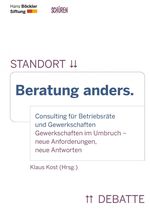 How can advisers contribute to the strengthening of codetermination, participation and welfare state? Which projects and programmes are suitable to create a social Europe with the help of external expertise? 24 authors follow these questions in an anthology, which was published by the managing director of the consultancy company PCG Project Consult Prof. Dr. Klaus Kost in Essen. Besides Berthold Huber, chairmen of IG Metall trade union, Michael Vassiliadis of the executive board of IG BCE, also speaks about the cooperation of trade unions with external advisers. Dr. Werner Altmeyer from the training and consultancy network "euro-workscouncil.net" is represented with the following contribution: "Making apples and pears comparably: Adviser in the intercultural context". Klaus Kost (Hrsg.) Beratung anders. Consulting für Betriebsräte und Gewerkschaften Gewerkschaften im Umbruch – neue Anforderungen, neue Antworten Marburg 2008, 224 pages, paperback, € 19,90
Who wants to challenge negative consequences of the globalisation cannot stop at the borders of the EU. However, at an international level an obligatory order framework is missing. To fill this gap, the trade unions conclude international framework agreements about social minimum standards with multinational companies. In the negotiations and the supervision of these agreements European works councils also play an important role. Dr. Reingard Zimmer of the training and consultancy network " euro-workscouncil.net " examines in her thesis the implementation of international social minimum standards under legal and political points of view, one chapter deals with European works councils particularly. Reingard Zimmer Soziale Mindeststandards und ihre Durchsetzungsmechanismen Sicherung internationaler Mindeststandards durch Verhaltenskodizes? Baden-Baden 2008, 398 pages, paperback, € 69,-
The European Commission is the driving force of the privatization of public services. The consequences are often employment reduction, precarious work and wage cuts. 25 authors represent the development in this anthology for some business sectors in Germany (energy, water-supply and distribution, hospitals, mass transit, post, telecommunications) and in select neighbouring countries (UK, Austria, Switzerland, Netherlands). Particularly interest is put on knowing which consequences privatizations have for the collective bargaining policy. Torsten Brandt/Thorsten Schulten/Gabriele Sterkel/Jörg Wiedemuth (Hrsg.) Europa im Ausverkauf Hamburg 2008, 400 pages, paperback, € 19,80
Guide on Private Equity for quick readers
Andrew Bibby The thirty-minute guide to Private Equity Nyon 2008, 34 pages, free We have compiled an additional technical literature on a special page.
|
|
12. Training and consultancy
network " euro-workscouncil.net ":
Examples of our work
|
|
From July 15th to 17th, 2008 a plenary meeting of the European works council of Bombadier took place in in the North-French town St.-Amand-les-Eaux. The Canadian group produces rail vehicles and business jets and has an EWC since 1998 according to British law.
The German chairman Johannes Hauber of the Mannheim plant wants to ensure better participation rights with regard to future restructurings. For this reason the EWC discussed a possible EU financed project and individual aspects of the valid EWC agreement under participation of the training and consultancy network "euro-workscouncil.net". In May 2008 German works councils of Bombadier had already discussed this matter at a meeting in Bautzen (see report in EWC News 2/2008).
Under the keyword "Anticipation of change" the European Commission supports such initiatives of European works councils with considerable financial subsidies. More exact details appeared already in EWC News 2/2008.
Negotiation body at tesa constituted
More intensive EWC work striven in a Spanish big bank For the German works councils the international cooperation gets more and more pressing. For this reason the German central works council was informed in the head office in Möchengladbach (photo) by the training and consultancy network " euro-workscouncil.net " on particularities of the Spanish labour law by Dr. Werner Altmeyer on August 13th, 2008. At present, possibilities of an EU financed project for the EWC of the Santander group, which has an important market position also in the UK are being viewed by the ver.di federal office and the European confederation of service trade unions (UNI). The European works council of Santander had signed an agreement on equal opportunities with central management on May 21st, 2008.
The European works council of West Pharmaceutical Services in Eschweiler (Germany) came on August 27th and 28th, 2008 together for its first meeting. The training and consultancy network " euro-workscouncil.net " held a seminar in this frame for the newly elected EWC members. The EWC agreement had been signed in March 2008 (see report in EWC News 2/2008), the process of the EWC foundation had started in 2006 (see report in EWC News 1/2006).
Training for Europe: Work, participation, intercultural competence
|
|
13.
Details of seminars planned
|
|
Registrations are possible for the following seminars and workshops co-made by us:
Europe for full time trade union officers of IG Metall Institutions, political fields, European works councils 13. -- 15.10.2008 in Bad Orb → Further information about this workshop
Works council activity in Europe, the European works council (EWC) EWC for professionals -- deepening and refresher course 03. -- 07.11.2008 in Berlin → Further information about this seminar
Requirements on an up-to-date company policy Conference of the study group work - business - policy of the Friedrich-Ebert-foundation 25.11.2008 in Berlin → Further information about this conference
Hamburg specialist conference for European works councils The new EWC Directive -- what comes towards us there? 26.01.2009 in Hamburg → Further information about this conference
Training for Europe, the European works council Concepts, distribution, practice experiences, development prospects 30. -- 31.10.2009 in Bochum → Further information about this seminar
Workshops of ver.di-federal office (further information follows soon)
In-house events Please find a survey of possible subjects of in-house events here: |
|
14. Imprint
|
EWC
News is published by: Training
and consultancy network "euro-betriebsrat.de" GbR Von-der-Tann-Straße
4, D-20259 Hamburg www.euro-workscouncil.net (English) www.euro-ce.org
(French) Authors
collaborating on this issue: Werner Altmeyer,
Carmen Bauer, Ulrich Zachert,
Reingard Zimmer Distributor
of the German
version: 11,149 readers Distributor of
the English version: 1,289 readers Distributor of
the French version: 1.038 readers Newsletter
archive: www.ewc-news.com
We
are always pleased to
receive comments and suggestions in relation to this newsletter as well
as reports on your EWC activities. Please write us at: info@euro-workscouncil.net
www.euro-betriebsrat.de (German)
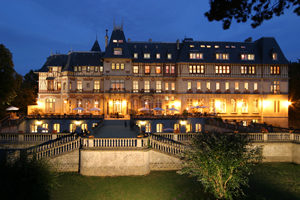


 On
behalf of the European Commission the consultancy firm GHK Consulting
from London conducted between January and April 2008 telephone
interviews in 70 companies, which have a European works council.
Amongst them were 14 French companies as well as ten each with
headquarters in Germany and the UK. Meanwhile the final report, which
exactly estimates all costs a European works council causes is
available.
On
behalf of the European Commission the consultancy firm GHK Consulting
from London conducted between January and April 2008 telephone
interviews in 70 companies, which have a European works council.
Amongst them were 14 French companies as well as ten each with
headquarters in Germany and the UK. Meanwhile the final report, which
exactly estimates all costs a European works council causes is
available. 

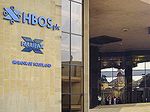





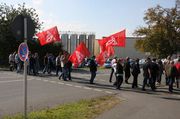










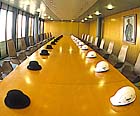
 The pump manufacturer Wilo from Dortmund
(Germany) has enrolled as an European Company (SE) since July 24th,
2008. A participation agreement which confirms a one-third
participation of the employees in the supervisory board had been signed
on July 1st, 2008 a few days before. Wilo has worldwide 6,000
employees, in Germany almost 1.900. The company can avoid an equally
occupied German supervisory board, which is legally binding as of 2,000
employees, by transforming into a SE. According to existing SE law the
status quo (here the German one-third participation) is confirmed for
ever.
The pump manufacturer Wilo from Dortmund
(Germany) has enrolled as an European Company (SE) since July 24th,
2008. A participation agreement which confirms a one-third
participation of the employees in the supervisory board had been signed
on July 1st, 2008 a few days before. Wilo has worldwide 6,000
employees, in Germany almost 1.900. The company can avoid an equally
occupied German supervisory board, which is legally binding as of 2,000
employees, by transforming into a SE. According to existing SE law the
status quo (here the German one-third participation) is confirmed for
ever.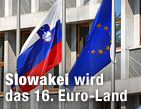
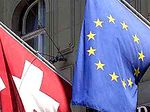





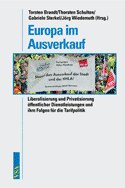
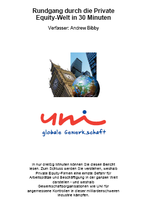


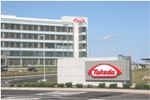

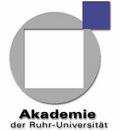 Under
this title the academy of the Ruhr university in Bochum (Germany)
starts from January 2009 a series of further education for trade
unionist and works council members which are occupied with EU relevant
issues. Single modules deal with work relations and labour law,
business management questions, intercultural competences or
professional associations policy in the EU. In cooperation with the
training and consultancy network " euro-workscouncil.net " an own
module is offered on the European works council. The following texts
are available only in German:
Under
this title the academy of the Ruhr university in Bochum (Germany)
starts from January 2009 a series of further education for trade
unionist and works council members which are occupied with EU relevant
issues. Single modules deal with work relations and labour law,
business management questions, intercultural competences or
professional associations policy in the EU. In cooperation with the
training and consultancy network " euro-workscouncil.net " an own
module is offered on the European works council. The following texts
are available only in German: